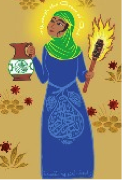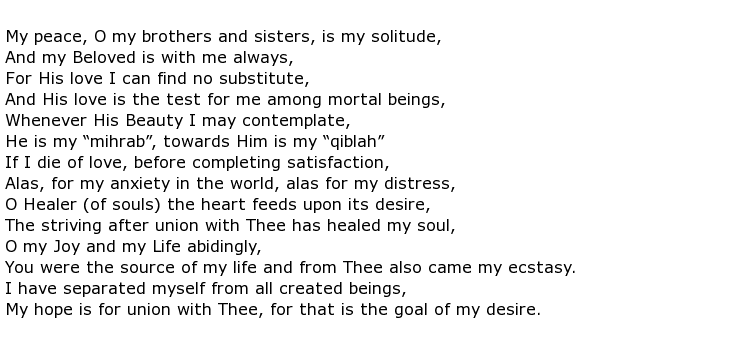 Rabiʿah al-Basri was also known as Rabiʻa al-ʻAdawiyya al-Qaysiyya and it is believed that she lived in Basra, in Iraq, in the first century AD. Her name “al-Basri” certainly suggests that she was a native of Basra but, as with all historical records from so long ago, much of what has been written down relies on speculation and legends passed down. It is hard to separate fact from fanciful fiction but the records show that she was a Sufi mystic and Muslim saint, and also a poet. Not surprisingly every poem that has been attributed to her has a strong religious theme. Those that are on the record as belonging to her are there mostly because a later Sufi saint and poet – one Farid ud din Attar – said they were hers.
Rabiʿah al-Basri was also known as Rabiʻa al-ʻAdawiyya al-Qaysiyya and it is believed that she lived in Basra, in Iraq, in the first century AD. Her name “al-Basri” certainly suggests that she was a native of Basra but, as with all historical records from so long ago, much of what has been written down relies on speculation and legends passed down. It is hard to separate fact from fanciful fiction but the records show that she was a Sufi mystic and Muslim saint, and also a poet. Not surprisingly every poem that has been attributed to her has a strong religious theme. Those that are on the record as belonging to her are there mostly because a later Sufi saint and poet – one Farid ud din Attar – said they were hers.
The birthplace of Rabiʿah al-Basri is unknown but she certainly lived in Basra all of her life. It is recorded that she was born in the year 717 AD, into a poor family. Around the time of the death of her father the country suffered a great famine and families were scattered and often broken up in the chaos that ensued. Rabiʿah was travelling in a caravan which was apparently attacked by vagabonds and thieves. It was customary at that time for able bodied men and women to be sold into slavery and this was her fate for some time afterwards.
She was already dedicated to meditation and prayers and would carry out this ritual at the end of each day, following whatever labours were set by her master. She would write down her innermost thoughts, perhaps in verse, and pray all night to the Lord. The story goes that her master discovered her one night, at prayer, and saw that her head was enveloped in some kind of divine light. He was shocked into releasing her from slavery, believing perhaps that he would be punished (from above?) if he did not do so.
Rabiʿah then began a strict, ascetic life which meant that she could enjoy no comforts or material wealth of any kind. She believed that God himself was guiding her thoughts, written words and actions and that there was no need for any earthly teachings. She was truly in touch with the Lord and wanted for nothing else. To her, God was “her Beloved” and it is believed that she wrote the following poem, titled My Beloved:

So spartan was her life that she carried with her only: a broken jug to eat or drink from; a rush mat to pray and sleep on; and a brick on which to lay her head at night. Presumably she MUST have had some sleep even though legend suggests that she spent all night in prayer but that, of course, would have been physically impossible.
Her fame spread and she even had proposals of marriage from men in exalted positions but all were rebuffed in favour of her devotion to God. It was her philosophy that God should be loved for His own sake and not because people feared Him. She was probably the first to introduce this idea of Divine Love. Her views could certainly be seen nowadays to be extreme, and maybe they were also seen that way at the time (by some). An example of one of her prayers illustrates her unequivocal view of how life should be led:

Despite her absolute rejection of any kind of self-indulgence Rabiʿah survived into her 80s. She was an active campaigner against slavery and refused to have one herself even when she acquired the status that would have warranted such help.
Right up to her death she assured all her followers that her Beloved “…is always with me”.
It is believed that Rabiʿah al-Basri died in 801 AD, aged 84.

